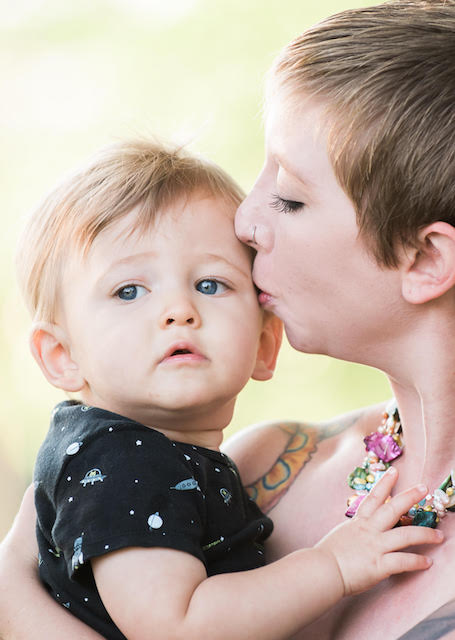I grew up under a lot of pressure.
I was a jellyfish living at the bottom of the ocean, somehow surviving the sheer weight of the water above threatening to crush me like an empty soda can.
Most of it was self-imposed. I was a serious dancer in a competitive atmosphere for a decade, and it’s hard to endure the prolonged stress of that environment without it affecting your emotional health.
Eventually, I folded like a house of cards.
Take it from me: When a mentally compromised, burnt-out, OCPD perfectionist, middle child, A-student burns out, it is not pretty. Life is hard when getting a B+ is an extinction-level catastrophe.
Things are different now.
Now, I have a 17-month-old. (And, yes, he is perfect, thank you for noticing.) My burgeoning family has been the center of my universe since they unexpectedly pulled the tiny baby from my abdomen, dripping with goo.
My son is my motivation. Not being the best dancer, the smartest student or the model daughter. Not perfection.
It’s hard, however, to escape old habits. I still occasionally have the voice of my inner monologue whispering into my cerebrum that I’m not good enough, that I should be doing more.
You would think that might affect my perspective on raising my son. You would think I would encourage him to be an A student, because, you know, SATs and college and the eventual corporate ladder. You would think it would be of utmost importance that he achieve his full academic and professional potential.
You’d think that. But it’s absolutely not the case. To be honest, I would be perfectly happy raising a C student.
But, hold on, hold on, hold on. Don’t go running away with that. If my son is going to be a C student—the kind of C student I would consider it a privilege to raise—there are qualifications.
He must learn compassion and empathy. He must learn to be kind. He must learn to respect others’ feelings and opinions, to embrace the social contract, to stand up occasionally when a lady leaves the table. He must listen, not just to me (though, I sincerely hope he does listen to me), but also to his elders, his teachers, his classmates. He must learn to consider their points of view.
My son must volunteer his time to a cause about which he is passionate. He must spend a time working in the service industry, so he can learn about the difficulties of managing the myriad personalities of the human populace. He must read something of worth every single day, even if it’s a struggle; I’ll be here to help him every step of the way.
He’s going to learn to play fair, and to play hard. He’s going to do his own godforsaken laundry.
These will be the requirements of bringing home a report card with solid Cs. Don’t think, though, that there will be any disappointment over that. Provided my child is trying his best, I don’t give a good goddamn if he brings home Cs.
Provided that he is well-rounded, a hard worker, socially aware and innately just, he will learn that he is winning at life regardless of his report card.
What do I hope to accomplish with this? What are my goals for my son, for his future, with this sort of parenting paradigm?
It’s painfully clear. He may or may not go to college. It may or may not be a prestigious college. He may not go to medical school or study astrophysics or manage a hedge fund. In fact, he might go to a safety state school and study accounting and graduate with a 2.9 GPA.
But if he meets and marries a lovely young woman or gentleman, gets a job doing something that matters to him, understands the joy of parenthood if he so chooses, enjoys living mindfully in the moment and can experience true happiness through good food, friends and family, then he has experienced success—far more success, in my opinion, than an unhappy Ivy League M.D., Ph.D., like my former friend ended up being.
I haven’t yet worked out the details of what this will look like in day-to-day life. I certainly don’t want my son to think he doesn’t have to work; I don’t want him to think he doesn’t have to try. I imagine it will be a delicate balance of gentle expectations and, at times, tough love. My hope in this is only that he might achieve what is so often missed in our K-12 structure of enlightening our children:
He might learn, not individual a priori facts, but how to think.
I’ll be the first to admit that this is a little premature. He is, after all, 17 months old. But, with or without my control, the day will come when my son brings home a C on a science test, and I want to make sure now that I will not repeat patterns from my own childhood.
He will know, above all, that he is loved despite his GPA He will know he is gifted and has unique talents, even if his SAT scores are in the gutter. He will know the only requirement for my pride is that he not give up when he truly wants or needs something, even if he fails the first few times.
He will not be permitted to stay up studying until one a.m. like I did, even if he is taking AP courses. He will learn to care for his mind and body first, before sacrificing either of them in the pursuit of a 100 percent test score, which will, more likely than not, be forgotten by the next semester.
He will, if all goes well, graduate as something we are seeing more and more rarely: A self-sufficient young man who views the world from a vantage point greater than the sum total of his own experiences.
So, that’s the plan. My goal, at the end of the day, is to turn out a generous, thoughtful and self-aware man-boy, who may or may not be a straight A+ pupil.
But I will love him, obviously, regardless of his grade point average. And I will teach him that his worth is not wrapped up in his knowledge of the Krebs Cycle.
Of course, if he wants to be a neurosurgeon, and gets into Harvard on full scholarship, I’m totally okay with that, too.
~
Author: Shannon Frost Greenstein
Image: Author’s Own
Editor: Toby Israel
~







Read 0 comments and reply